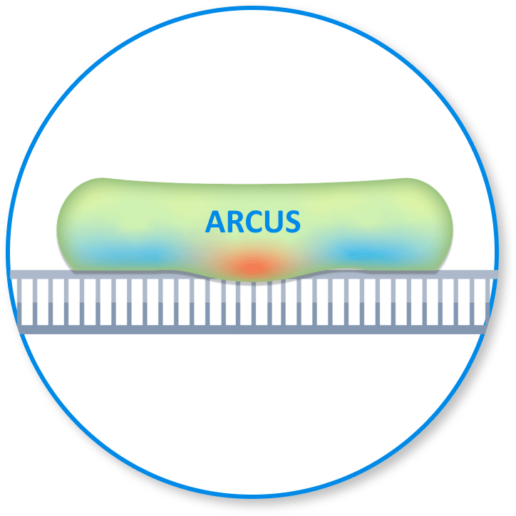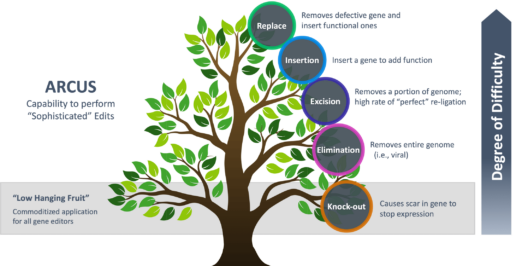ARCUS is a proprietary genome editing technology discovered by scientists at Precision BioSciences
ARCUS is based on a naturally occurring genome editing enzyme, I-CreI, that evolved in the algae Chlamydomonas reinhardtii to make highly specific cuts and DNA insertions in cellular DNA. I-CreI is a member of a larger class of enzymes called homing endonucleases or meganucleases.

The unique advantages of ARCUS relate to type of cut, small size, and simplicity

- 3 Prime Overhang Cut
- Homology-Directed Repair (HDR)
- Complementary overhangs drive “Perfect” Re-ligation

- Smallest gene editor (~1500 bp)
- Enables delivery of MORE payload, which then enables sophisticated edits
- Delivery, both non-viral and viral, to diverse tissues in the body

- Only single component editor that recognizes and cuts DNA
- Single component streamlines delivery and results in the highest efficiency
- Single component editor requires lower dose of delivery vehicle
ARCUS for the More Sophisticated Gene Edit
Designed by nature for a multitude of applications versus other gene editing modalities

Wholly owned programs include:
PBGENE-HBV
PBGENE-HBV is being developed for the treatment of patients with chronic hepatitis B, with submission of a clinical trial application (CTA) and/or investigational new drug (IND) application targeted for 2024. During the R&D Day, Precision showed data highlighting the potential of PBGENE-HBV to eliminate covalently closed circular DNA and inactivate integrated hepatitis B virus (HBV) DNA to drive durable antigen loss, leading to a potential functional cure.
PBGENE-PMM
PBGENE-PMM is being developed as a first-in-class opportunity for treatment of m.3243 associated primary mitochondrial myopathy. Mitochondrial diseases are the most common hereditary metabolic disorder, affecting 1 in 4,300 people. PMM currently lacks a curative treatment and impacts approximately 50% of patients navigating mitochondrial disease. The high specificity and single component nature of Precision’s mitoARCUS nucleases are designed to enable specific editing of mutant mitochondrial DNA while allowing the normal (wild-type) mitochondrial DNA to repopulate in the mitochondria and restore normal function. Precision expects to file a CTA and/or IND in 2025.

